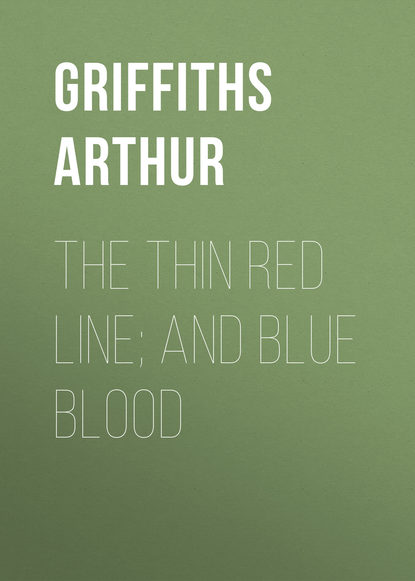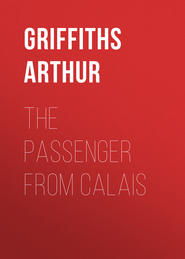По всем вопросам обращайтесь на: info@litportal.ru
(©) 2003-2024.
✖
The Thin Red Line; and Blue Blood
Настройки чтения
Размер шрифта
Высота строк
Поля
"Heavens above!" cried the colonel, fiercely. He was of the old school, and used expletives freely. "You must be an idiot!"
"I am sensible, sir, of the honour you would do me, but—"
"Nonsense, man! I insist. I must have you."
"No, sir," said Hyde, firmly, "I must decline the honour."
"Was there ever such an extraordinary fellow? Why, man alive! it will reinstate you—"
"I must beg, sir," said Hyde, hastily interrupting, and looking with intention towards the adjutant.
"Yes, yes! I understand," said the colonel. "Leave us, Mr. Smallfield; I wish to speak to Sergeant Hyde alone."
"You have my secret, Colonel Blythe," said Hyde, when the adjutant had left the room, "but I have your promise."
"I was near forgetting it, I confess; but I was so upset, so put out, at your cursed obstinacy. Why will you persist in keeping in the background? Accept this promotion, and you shall have a commission before the year is out."
"I do not want a commission; I am perfectly happy as I am."
"Was there ever such a pig-headed fellow? Come, Hyde, be persuaded." The colonel got up from his seat and walked round to where the sergeant stood, still erect and motionless. "Come, Rupert, old comrade, old friend," and he put his hand affectionately on the sergeant's shoulder.
The muscles of the sergeant's face worked visibly.
"It's no use, Blythe; I am dead to the world. I have no desire to rise."
"But it's so aggravating; it puts me in such a hole," said the colonel, striding up and down the office. "You're just the man we want—superior in every way. You would hold your own so well with the other non-commissioned officers. I do wish—Where am I to find another?"
"I can tell you, if you will listen to my advice."
"Yes? Speak out."
"Young McKay; he would make an excellent sergeant-major."
"I know him—a smart, sensible, intelligent young fellow. But has he ballast—education?"
"He is better born than you or me, colonel. A lad of excellent parts and first-rate education. Bring him on, and he will do you and the regiment credit yet."
The colonel sat down again at his desk, and seemed lost in thought.
"I must ask Smallfield. Call in the adjutant, will you?" he added, in a voice that implied their conventional relations as superior officer and sergeant were resumed.
Half an hour later McKay was standing in Hyde's place, receiving the same offer, but accepting, although diffidently.
"I am not fit for the post, sir," he protested.
"That's my affair. I have selected you for reasons of my own, and the responsibility is mine."
"I will try my best, sir; that is all I can say."
"It's quite enough. Do your best, and you will satisfy me."
"I can't think why he chose me," confided Stanislas to his friend Hyde, later on, in the sergeants' mess.
"Can't you?" replied his friend, drily. "It's a case of hidden merit receiving its right reward."
"I have never thought that the colonel noticed me, or distinguished me from any of the other sergeants," said Stanislas.
"Probably your good qualities were pointed out to him," replied Hyde, still in the same tone. "Or your fine friends and relations have used their influence."
"It is little likely; and, as I tell you, I don't understand it in the least."
"Leave it so. No doubt you will find out some day. In the meantime do justice to your recommendation, whoever gave it. You have got your foot on the ladder now, but no one can help you to climb; that must depend upon your own exertions."
"Yes, but you can help me, Hyde, with your advice, encouragement, support. I am very young to be put up so high, and over men of standing and experience like yourself."
"You will have no more loyal subordinate than me, Sergeant-major McKay. Come to me whenever you are in trouble or doubt. I will do all I can, you may depend. I like you, boy, and that's enough said."
The old sergeant seized McKay's hand, shook it warmly, and then abruptly quitted the room.
Stanislas was eager to tell this pleasing news of his promotion to Mariquita; but she was the last person to hear it, notwithstanding. McKay entered at once upon his new duties, and they kept him close from morning till night. A good sergeant-major allows himself no leisure. He is the first on parade, the last to leave it. He is perpetually on the move; now inspecting guards and pickets, now superintending drills, while all day long he has his eye upon the conduct of the non-commissioned officers, and the demeanour and dress of the private men.
There was no time to hang about the tobacconist's shop in Bombardier Lane, waiting furtively for a chance of seeing Mariquita alone. They kept their eye upon her, too; and when at last he tore himself away from his new and absorbing duties he paid two or three visits to the place before he could speak to her.
Mariquita received him coldly—distantly.
They were standing, as usual, on each side of the low fence at the end of the garden.
"What's wrong, little star? How have I offended you?"
"I wonder that you trouble to come here at all, Don Stanislas. It's more than a week since I you."
"I have been so busy. My new duties: they have made me, you know—"
"Throw that bone to some other dog," interrupted Mariquita, abruptly. "I am to be no longer deceived by your pretended duties. I know the truth: you prefer some other girl."
"Mariquita!" protested McKay.
"I have heard all. Do not try to deny it. She is tall and fair; one of your compatriots. You were seen together."
"Where, pray? Who has told you this nonsense?"
"At Waterport. Benito saw you."
McKay laughed merrily.
"I see it all. Why, you foolish, jealous Mariquita, that was my general's wife—a great lady. I was attending and following her about like a lackey. I would not dare to lift my eyes to her even if I wished, which is certainly not the case."
Mariquita was beginning to relent. Her big eyes filled with tear, and she said in a broken voice, as though this quarrel with her lover had pained her greatly—








